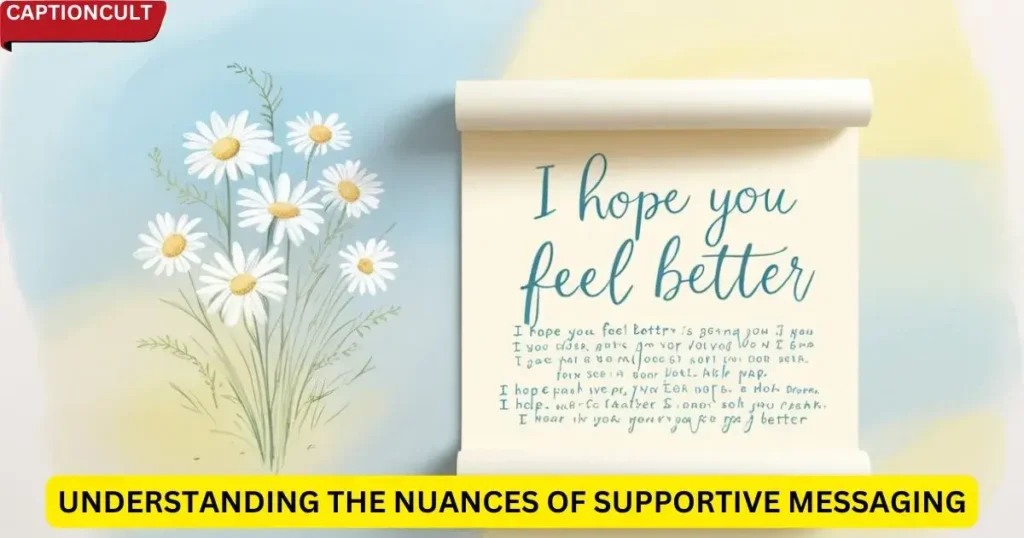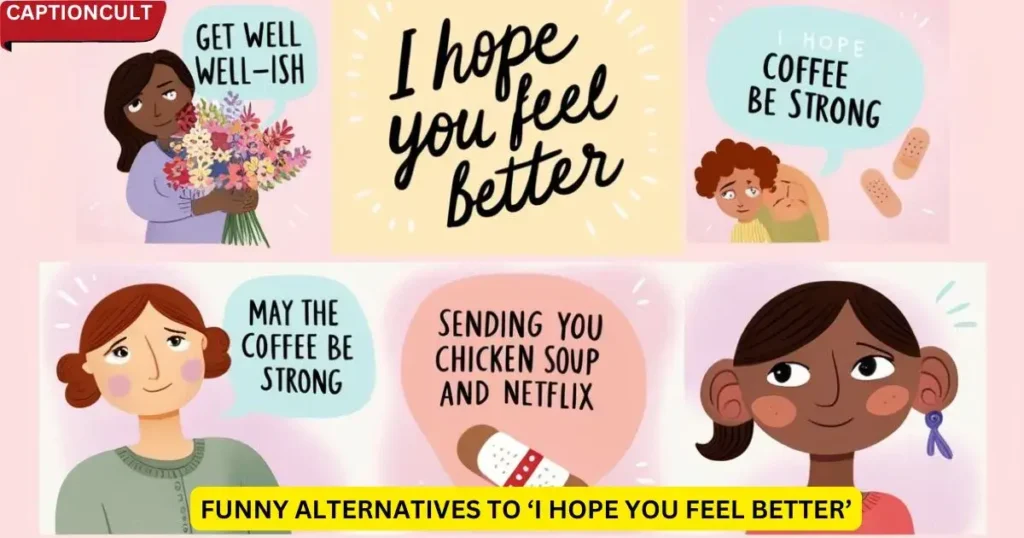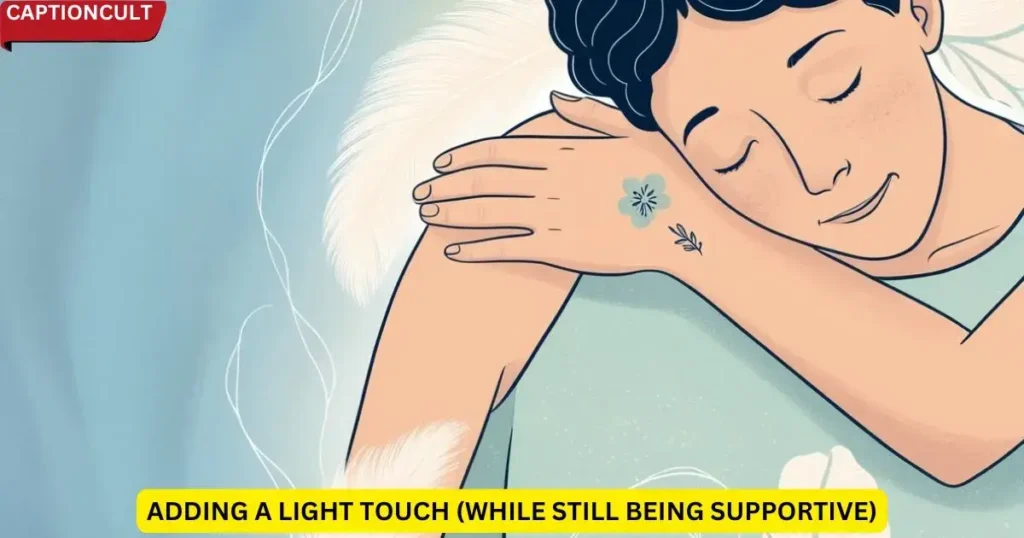Saying “I hope you feel better” is a common expression of sympathy and well-wishes, but sometimes it feels a little generic. The right words can make a significant difference in offering genuine support and comfort to someone who is ill or going through a tough time. Choosing the perfect alternative to “I hope you feel better” depends heavily on your relationship with the person, the context of their situation, and the tone you want to convey.
This article explores the nuances of expressing care and concern, offering a wide array of alternatives categorized for different situations and levels of formality. The goal is to equip you with the language to offer genuine emotional support and well-wishes, whether you’re speaking to a colleague, a friend, or a family member.
Why Meaningful Communication Matters
“I hope you feel better” is used because it’s a simple, universally understood expression of well-wishes and sympathy. It’s a socially acceptable way to acknowledge someone’s illness or discomfort and offer a brief message of hope. However, its very simplicity can sometimes make it feel impersonal or lacking in genuine warmth. The phrase lacks nuance and doesn’t always effectively convey the depth of your concern or understanding. This is why exploring alternative phrases is important, particularly when you want to express a deeper level of empathy and support.
Understanding the Nuances of Supportive Messaging

The Psychology of Well-Wishes
Empathy is more than just saying words—it’s about creating a meaningful connection. Different situations require different approaches:
- Health Conditions: Serious illness
- Professional Settings: Workplace recovery
- Personal Struggles: Emotional or physical challenges
37 Best Alternatives to ‘I Hope You Feel Better’ | General, Professional & Funny Ways

This section provides a diverse range of alternatives to “I hope you feel better,” categorized for clarity and ease of use. Remember that choosing the right phrase requires considering the recipient and context.
General Alternatives to ‘I hope you feel better’
- Sending you healing thoughts. This conveys empathy and suggests a deeper connection than a simple wish for improvement.
- Thinking of you and wishing you a speedy recovery. This offers both support and a specific wish for improvement.
- Wishing you strength and a swift return to good health. This is a powerful statement of support, focusing on the recipient’s resilience.
- I’m thinking of you and sending positive vibes your way. This is a more informal, yet still sincere, expression of support.
- Hoping for a quick recovery! This is a concise and direct way to express your well-wishes.
- Wishing you better days ahead. This focuses on the future and offers a more optimistic outlook.
- Take care of yourself and get plenty of rest. This combines a well-wish with practical advice.
- Hoping you feel better soon. This is a slightly more active and direct approach than simply hoping they feel better.
- Wishing you all the best in your recovery. This is a versatile option that conveys general well-wishes.
- May you find peace and healing during this time. This is a more thoughtful and empathetic choice, particularly for more serious illnesses.
- I’m here for you if you need anything at all. This offers practical support alongside your well-wishes.
- My thoughts are with you. A simple but powerful statement of solidarity and support.
- Wishing you comfort and healing. This focuses on emotional well-being alongside physical recovery.
- Hoping you’re feeling a little better today. This shows you’re actively thinking about their progress.
- Praying for your speedy recovery. This is appropriate if you share a religious faith with the recipient.
Professional Alternatives to ‘I Hope You Feel Better’
- I hope you are on the mend soon. A more formal way of expressing hope for a speedy recovery.
- Wishing you strength and health. A formal and respectful expression of support.
- We’re thinking of you and wish you a prompt recovery. Suitable for a professional setting, emphasizing collective concern.
- We hope you’re feeling better soon and look forward to your return. This blends well-wishes with a focus on their return to work.
- Please focus on your health, and we’ll be here when you return. This shows you value their health and prioritize their recovery.
- Take all the time you need to recover completely. We’ll handle things here. This is a supportive and reassuring message for a workplace.
- We wish you a speedy and complete recovery. A concise and formal expression of support.
- Hoping you’re recovering well and will be back on your feet soon. A more casual yet professional option.
- We’re keeping you in our thoughts as you recover. Suitable for a larger team or organization.
- Wishing you a smooth recovery process. This shows a professional yet caring approach.
Funny Alternatives to ‘I Hope You Feel Better’

- Get well soon! Netflix won’t watch itself! This adds humor to a well-wish, suitable for close friends or family.
- Hope you’re back on your feet faster than a kid on a sugar high! A lighthearted expression of hope for a quick recovery.
- Don’t worry, be happy (and get well soon!). A playful reminder to maintain positivity.
- Wishing you a speedy recovery – and a mountain of tissues! This is a lighthearted approach, particularly suitable for a cold or flu.
- Hope you’re feeling better than a sloth at a marathon! A funny yet supportive expression of hope.
- Get well soon, you magnificent beast! This is a supportive but humorous message for someone you know well.
- Wishing you a recovery so speedy, it’ll make a cheetah jealous! A humorous way of expressing hope for quick healing.
Expressing Deep Concern and Empathy
- “I’m so sorry to hear you’re going through this. Please know I’m thinking of you and sending all my strength and positive energy your way.” (Suitable for serious illnesses or difficult situations.)
- “This sounds incredibly challenging. I’m here for you, whatever you need, whether it’s a listening ear, practical help, or just a distraction.” (Offers both emotional and practical support.)
- “I can only imagine how difficult this must be. Sending you my deepest sympathy and wishing you peace and healing.” (Expresses deep empathy and understanding for a difficult situation.)
- “I’m truly heartbroken to hear about this. Please accept my sincere condolences and know that I’m here for you every step of the way.” (Suitable for loss or significant setbacks.)
- “Your strength and resilience are inspiring. I’m sending you all the strength I can muster as you navigate this.” (Focuses on the recipient’s strength and offers encouraging support.)
Focusing on the Recovery Process
- “I’m so glad to hear you’re on the mend. Keep taking it easy and focusing on your recovery.” (Acknowledges progress and encourages continued self-care.)
- “Wishing you a smooth and steady recovery. Take your time, and don’t push yourself too hard.” (Emphasizes a gradual and healthy recovery process.)
- “I’m checking in to see how you’re doing. Is there anything I can do to help you along in your recovery?” (Shows active care and offers practical assistance.)
- “I hope each day brings you a little more strength and ease. Remember to celebrate the small victories along the way.” (Encourages positive thinking and acknowledges the incremental nature of recovery.)
- “Keep up the amazing work on your recovery! Your dedication is inspiring.” (Directly acknowledges and praises the recipient’s efforts.)
Adding a Light Touch (While Still Being Supportive)

- “Sending you sunshine and good vibes to brighten your day and speed up your healing.” (A cheerful yet sincere expression of support.)
- “Hoping your recovery is filled with comfy blankets, good books, and lots of rest!” (Uses imagery to convey a supportive message.)
- “Wishing you a recovery so relaxing, it makes a spa day look like a marathon!” (Humorous but still supportive and appropriate for close friends or family).
Remember to adapt these phrases to the specific situation and your relationship with the recipient. The most important aspect is the sincerity and genuine concern behind your words.
Personalized Messages: Adding a Personal Touch to your Feel Better Alternatives
Beyond these general options, remember the power of personalization. Adding a personal touch makes any expression of support more meaningful. Consider these aspects:
- Reference a shared experience: “Remember that time we both had the flu? You’ll be back to normal in no time!”
- Mention something specific: “I heard you were feeling under the weather. I hope you’re able to relax and recover fully.”
- Offer specific assistance: “Let me know if you need anything – groceries, errands, or just someone to talk to.”
These personalized additions make your expression of support more genuine and demonstrate deeper empathy.
Generic, Professional, and Funny Alternatives Summarized
Here’s a quick summary table to help you choose the best option:
| Category | Example | Suitability |
|---|---|---|
| Generic | Sending healing thoughts. | Most situations |
| Thinking of you and wishing you a speedy recovery. | Most situations | |
| Professional | I hope you are on the mend soon. | Work colleagues, clients, formal settings |
| Wishing you strength and health. | Work colleagues, clients, formal settings | |
| Funny | Get well soon! Netflix won’t watch itself! | Close friends, family, informal settings |
| Hope you’re back on your feet faster than a kid on a sugar high! | Close friends, family, informal settings |
FAQ: Navigating Well-Wishes and Support
What to say instead of “I hope you feel better”?
Explore various options depending on your relationship with the person and the situation; personalize your message for a more meaningful impact. Consider offering practical help alongside your well wishes.
How to say “hope you feel better”?
Express genuine care through personalized messages; use words that offer support and hope for a quick recovery. Focus on their strength and resilience rather than just their ailment.
How to say “I hope you feel better”?
Reframe the sentiment with alternatives like wishing them strength, sending positive vibes, or expressing hope for their speedy recovery. Adding a personal touch makes a significant difference.
What else can I say instead of “I hope you feel better”?
Numerous alternatives exist; select phrases conveying empathy, support, and well-wishes, appropriate for the context and your relationship with the recipient. Consider adding a personal touch.
What can I say instead of “I hope it gets better”?
Express hope for improvement using phrases like “Wishing you brighter days ahead” or “Hoping things look up soon”. Offer practical help if possible.
How to professionally say “I hope you feel better”?
Use formal language expressing support and well-wishes for their recovery; avoid casual phrases, focusing instead on their health and prompt return. Offer assistance within professional boundaries.
What can I say instead of “I feel better”?
Share your improved condition by saying something like “I’m feeling much improved” or “I’m recovering nicely.” Avoid overly informal language in professional settings.
Conclusion: The Power of Genuine Connection
Replacing “I hope you feel better” with a more thoughtful and personalized message significantly improves the impact of your well-wishes. Remember to consider the context, your relationship with the person, and the tone you aim to convey. Whether you choose a heartfelt expression of empathy, a professional note of concern, or a lighthearted joke, the sincerity behind your message is what truly matters.
The goal is to offer genuine support and emotional comfort during someone’s recovery. Your words have the power to make a real difference in their journey back to health. Choose wisely, and let your sincerity shine through.

This is a passionate author whose work explores the power of language and storytelling. With a keen eye for detail and a commitment to excellence, Julian believes that every word has the potential to create meaning and beauty. “Where Words Find Perfection” is a reflection of his dedication to crafting narratives that resonate deeply with readers.

